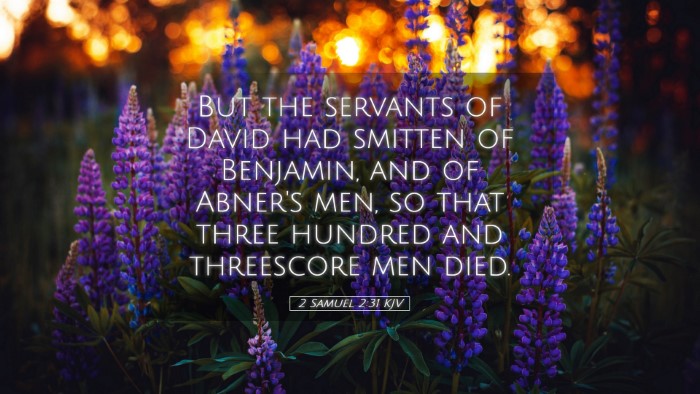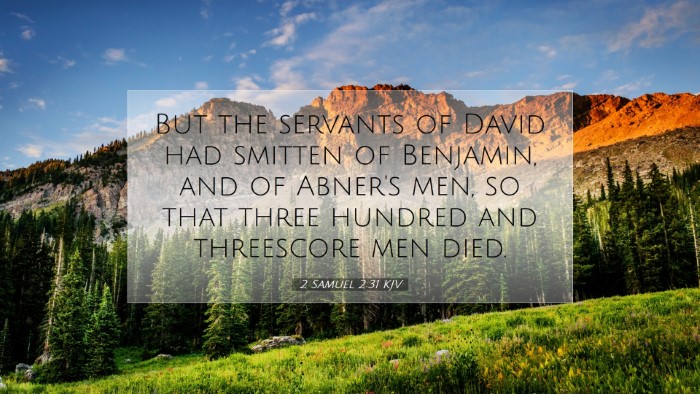Commentary on 2 Samuel 2:31
2 Samuel 2:31 states: "But the servants of David had smitten of Benjamin and of Abner's men so that three hundred and twenty men died."
Historical Context
This passage occurs in the context of the civil war that ensued following the death of King Saul. David, although anointed to be king, faced opposition from Saul's house. The strife is highlighted by the confrontations between David’s forces and those loyal to Ish-bosheth, Saul’s son.
Commentary Insights
Matthew Henry
Analysis of the Conflict: Matthew Henry emphasizes the territorial and political turmoil that characterized this period. He notes that the divided allegiance among the tribes led to significant bloodshed, which is tragically emblematic of a fractured nation. Henry reflects on the broader implications of civil strife, signifying how internal conflicts can lead to devastating consequences.
On the Number of Casualties: The mention of 320 deaths is insightful; it serves to highlight the scale of the conflict. It can be seen as a reflection of God’s providence in David's favor, as it indicates a decisive victory for his men. Henry however cautions against reading this as merely a numerical outcome, framing it instead within the narrative of God's sovereignty in choosing David over Saul.
Albert Barnes
Significance of the Figures: Barnes points out that the detailed mention of the number of warriors killed serves to provide a stark reminder of the severity of the battle. He interprets the ratio of casualties as a sign of divine assistance on the side of David’s soldiers, suggesting that God was with them in their quest for the kingdom.
The Role of Abner: Barnes highlights Abner, Saul's general, who led the forces against David. By noting the context of Abner’s loyalty to Ish-bosheth's claim to the throne, Barnes explores the dynamics of loyalty and leadership during a time of upheaval, underscoring how such allegiances can lead to dire consequences. He reflects on the reality that even strong leaders like Abner can find themselves on the wrong side of God’s purpose.
Adam Clarke
Detailed Commentary on Abner: Clarke provides an in-depth analysis of Abner’s character, delineating his shift from a loyal servant to a man caught in a bitter struggle for power. He prescribes moral lessons derived from Abner’s fall, noting that even those with high positions are not immune from the consequences of their choices and allegiances.
Theological Implications: Clarke elaborates on the theological ramifications of this conflict. He observes the overarching theme of divine providence as David emerges victoriously amidst chaos. Clarke notes that such victories not only serve to bolster David’s reign but also demonstrate the fulfillment of God’s promises to him.
Theological Reflections
- Divine Sovereignty: The passage illustrates a crucial theological principle: God's sovereignty in the affairs of men. Despite human scheming and conflict, God's purposes prevail, indicating that His will is ultimately unstoppable.
- Human Agency: The involvement of David’s men and their successful strategy against Abner’s forces shows the vital role of human agency in God's plans. It poses inquiries into the balance between divine sovereignty and human decision-making.
- Lessons from Conflict: Civil wars often arise from jealousy and ambition. The bloodshed witnessed here is a stark reminder for believers today to seek unity in Christ rather than discord and division.
- Justice and Retribution: The deaths of the soldiers serve as a sobering reminder that conflict carries weighty consequences. Such dynamics in conflict often reflect the biblical principle of reaping what one sows.
Modern Application
This passage is profound for modern readers. For pastors and theologians, it offers a poignant exploration of leadership amid adversity. It asks challenging questions regarding the motivations driving one’s pursuit of power and the necessity of aligning with God's will rather than personal ambition.
For students of the Bible, this narrative is a crucial study in understanding the historical context and moral imperatives present throughout Scripture. The meticulous accounts of such conflicts enable a clearer understanding of God’s overarching plan for His people.
Conclusion
2 Samuel 2:31 provides an intricate look at the consequences of civil strife against the backdrop of God’s overarching purpose for His chosen leader. The insights from Matthew Henry, Albert Barnes, and Adam Clarke contribute valuable perspectives for understanding the biblical narrative. As the church today seeks unity and purpose amid its complexities, this passage stands as a clear reminder of the hope and guidance available through faithful obedience to God.


